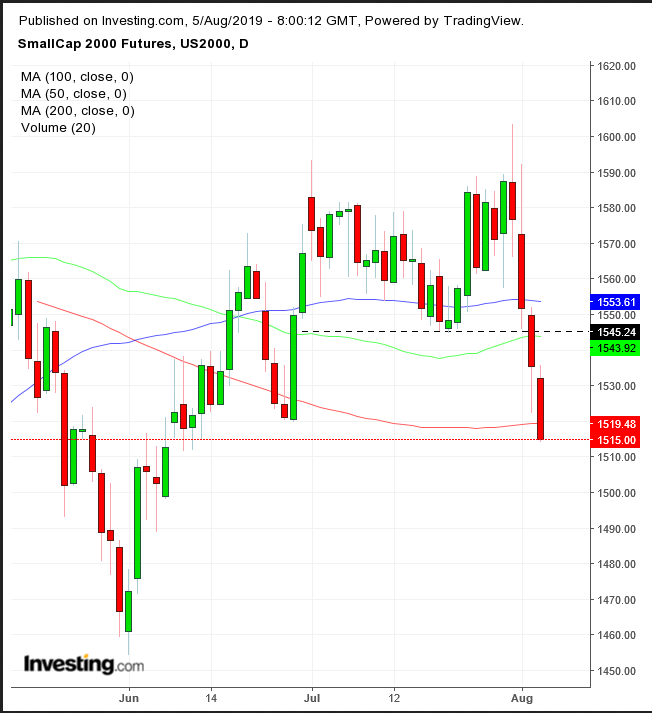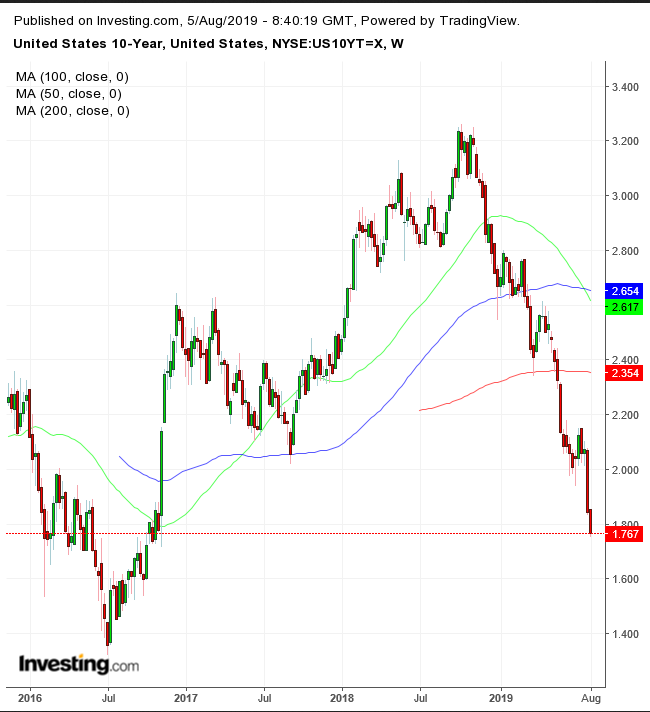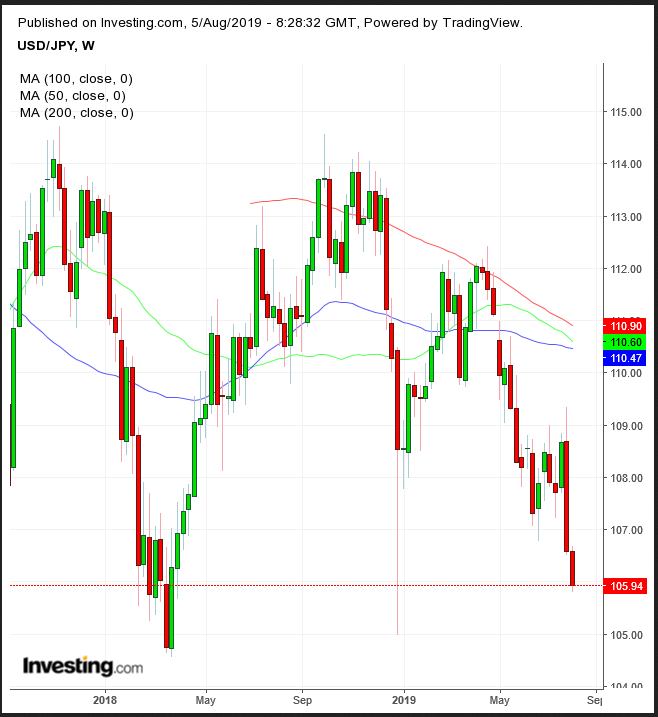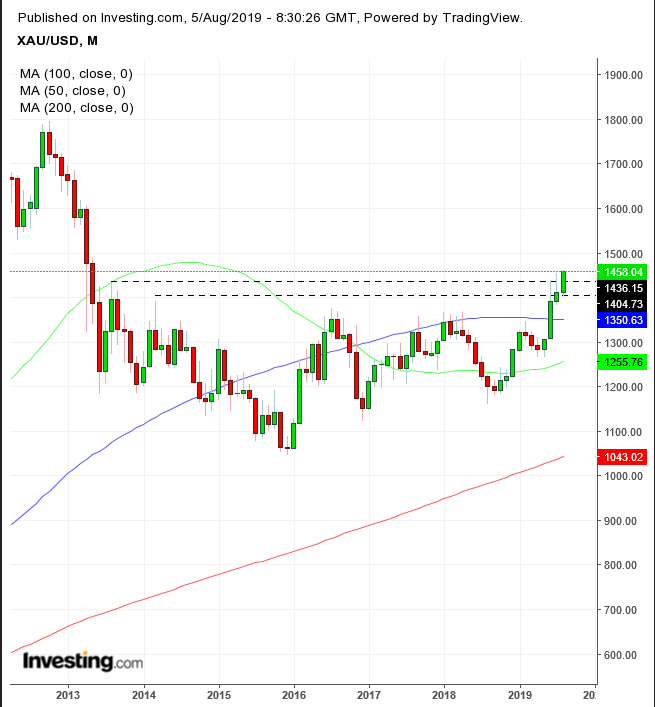Key Events
Futures on the S&P 500, Dow and NASDAQ 100 plunged with global stocks this morning on a spike in trade risk. U.S. Treasurys, the yen and gold reached long-term highs on investors' flight to safe havens, while oil dropped on fears the U.S.-China dispute will further strain global demand.
Contracts on the Dow and the SPX extended a selloff to the fifth day, while those on the NASDAQ and Russell 2000 entered their sixth falling session.

While all four contracts slipped below their 50 and the 100 DMA, small-cap futures also crossed beneath the 200 DMA, where they were trading at the low of the session. Overall, they extended the penetration following July’s double-top.
Europe's STOXX 600 opened lower and sharply extended Friday’s decline with mining and tech stocks, amid the highest volumes since June 21. The trade is at the bottom of the session, within one percentage point from the lowest price since February. The May 31 low is supported by the 200 DMA—just over half a percentage point lower than the current price.
In the earlier Asian session, stocks tumbled to a six-month low, posting the steepest daily plunge in 10 months. Investors' exodus from equities pushed the yuan to a ten-year low against the dollar as Chinese policymakers refused to defend the key 7.000 level—which has historically marked the line in the sand for intervention—likely weaponizing the renminbi in retaliation to U.S. President Donald Trump's 10% tariff blow on all remaining untaxed Chinese imports, worth $300 billion.
Moreover, the Chinese government reportedly urged its state-owned enterprises to halt imports of U.S. agricultural products, in response to the U.S. administration's latest tariff salvo.
China's Shanghai Composite (-1.62%) still managed to fare better than other regional markets, as the weakest currency in a decade in turn provided stocks with some cushioning.
Hong Kong’s Hang Seng gave up 2.85% as protracted civil unrest compounded heightened market uncertainty. Australia’s S&P/ASX 200 suffered a 1.9% loss after traders were reminded the country, which is China's biggest two-way trading partner and is already suffering from an economic contraction, stands to be hit harshly by further trade headwinds.
Global Financial Affairs

U.S. shares suffered their worst weekly loss of the year on Friday. Meanwhile, the yield on 10-year Treasurys hit the lowest level since October 2016, wiping out all gains from the Trump Trade that followed that year's presidential elections. We have been discussing for some time about the dichotomy of equities' record highs versus multi-low bond yields, arguing that sooner or later one asset will drag the other into the opposite direction—as of now, it seems that bonds are winning the battle.

The USD/JPY pair dropped to the lowest level since March, as the 50 DMA found resistance by the 200 DMA, a bearish sign.

Gold jumped to the highest price since May 2013, extending an upside breakout of a massive bottom dating back to 2014.
The U.S.-China trade war also overshadowed escalating Mideast tensions for the oil market, which slid lower despite the fact that Iran seized another foreign tanker in the Persian Gulf.
Up Ahead
- Earnings from international financial groups this week include: UniCredit (MI:CRDI), AIG (NYSE:AIG), ABN AMRO (AS:ABNd), Standard Bank (JO:SBKJ), Japan Post Bank (T:7182).
- Five Asian central banks have rate decisions including India, Australia and New Zealand.
- Fed policy makers speaking this week include: Governor Lael Brainard on Monday, followed by St. Louis chief James Bullard on Tuesday and Chicago’s Charles Evans on Wednesday—all three being FOMC voting members.
Market Moves
Stocks
- The MSCI Asia Pacific Index lost 1.9%, the largest decrease in 19 weeks.
- Hong Kong’s Hang Seng Index tumbled 2.7%, the biggest drop in three months.
- The MSCI Emerging Market Index fell 1.8%, its ninth consecutive decline.
Currencies
- The Dollar Index decreased 0.12% for the third day and a total loss of 0.6%.
- The British pound fell 0.4% to $1.211.
- The euro gained 0.1% to $1.1119.
- The onshore yuan sank 1.3%.
- The Taiwanese dollar dropped 0.8% on the biggest dip in seven months.
Bonds
- The yield on 10-year Treasurys slipped eight basis points to 1.76% with its seventh straight decline.
- The yield on 2-year Treasurys fell eight basis points to 1.63%.
- Japan’s 10-year yield slid three basis points to -0.192%.
- Germany’s 10-year yield declined four basis points to -0.53%.
Commodities
